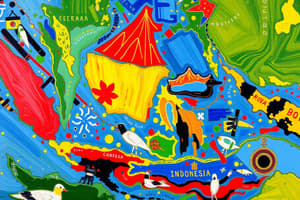Podcast
Questions and Answers
What is the primary focus of the lesson on Indonesia?
What is the primary focus of the lesson on Indonesia?
- Geography of Indonesia
- Cultural diversity in Indonesia (correct)
- Indonesia's political history
- Indonesia's economic challenges
Which traditional Indonesian dance is known for its intricate movements and storytelling?
Which traditional Indonesian dance is known for its intricate movements and storytelling?
- Bali Janger Dance
- Kecak Dance
- Legong Dance (correct)
- Saman Dance
What is a significant characteristic of Indonesian traditional music?
What is a significant characteristic of Indonesian traditional music?
- Influence of Western pop music
- Heavy reliance on electronic instruments
- Focus on solo vocal performances
- Use of Gamelan ensembles (correct)
Which of the following is a traditional Indonesian cuisine that is known worldwide?
Which of the following is a traditional Indonesian cuisine that is known worldwide?
The Indonesian phrase 'Bhinneka Tunggal Ika' translates to which of the following?
The Indonesian phrase 'Bhinneka Tunggal Ika' translates to which of the following?
Wat is in wichtich aspekta fan 'e kultuer fan Yndonezië dat it unyk makket?
Wat is in wichtich aspekta fan 'e kultuer fan Yndonezië dat it unyk makket?
Wêrom is Yndonezië bekend om syn biodiversiteit?
Wêrom is Yndonezië bekend om syn biodiversiteit?
Wat is in typysk kenmerk fan tradisjonele Yndonezyske arsjitektuer?
Wat is in typysk kenmerk fan tradisjonele Yndonezyske arsjitektuer?
Wêr is de measte Yndonezyske tradisjonele muzyk basearre op?
Wêr is de measte Yndonezyske tradisjonele muzyk basearre op?
Wat is in streektaal dy't net ferbûn is mei Yndonezië?
Wat is in streektaal dy't net ferbûn is mei Yndonezië?
Flashcards are hidden until you start studying
Study Notes
Indonesia Overview
- Indonesia is the world's largest archipelago, consisting of over 17,000 islands.
- The nation has a population exceeding 270 million, making it the fourth most populous country.
- Official language is Bahasa Indonesia, which unites the diverse ethnic groups within the country.
Geography and Climate
- Indonesia is situated between the Indian and Pacific Oceans, providing vast marine biodiversity.
- The country has a tropical climate, characterized by wet and dry seasons, heavily influencing its agriculture and lifestyle.
- Key islands include Sumatra, Java, Bali, Kalimantan (Borneo), and Sulawesi.
Economy
- Indonesia has a mixed economy, rich in natural resources such as oil, gas, timber, rubber, and palm oil.
- It is a member of the G20 and Southeast Asian Nations (ASEAN), reflecting its economic significance in the region.
- Agriculture, manufacturing, and services are major sectors contributing to GDP.
Culture and Society
- Indonesia is home to more than 300 ethnic groups, each with unique traditions and languages.
- Major religions include Islam, Christianity, Hinduism, and Buddhism, with Islam being the predominant faith.
- Festivals such as Nyepi (Balinese New Year) and Eid al-Fitr showcase the country's rich cultural diversity.
Historical Context
- Indonesia's history encompasses significant periods including colonial rule, World War II, and the struggle for independence in 1945.
- The country underwent political turmoil during the Suharto era, shifting towards a democratic system in the late 1990s.
Biodiversity and Conservation
- Home to diverse ecosystems, including rainforests, coral reefs, and volcanic mountains, Indonesia is one of the world's most biodiverse nations.
- Challenges include deforestation, illegal wildlife trade, and climate change, prompting various conservation efforts.
Government and Politics
- Indonesia operates as a presidential republic, with a strong emphasis on democratic governance and civil rights.
- Regional autonomy has been implemented, allowing local governments to manage resources and implement policies suited to their communities.
Indonesia Overview
- Indonesia is the world's largest archipelago, consisting of over 17,000 islands.
- The nation has a population exceeding 270 million, making it the fourth most populous country.
- Official language is Bahasa Indonesia, which unites the diverse ethnic groups within the country.
Geography and Climate
- Indonesia is situated between the Indian and Pacific Oceans, providing vast marine biodiversity.
- The country has a tropical climate, characterized by wet and dry seasons, heavily influencing its agriculture and lifestyle.
- Key islands include Sumatra, Java, Bali, Kalimantan (Borneo), and Sulawesi.
Economy
- Indonesia has a mixed economy, rich in natural resources such as oil, gas, timber, rubber, and palm oil.
- It is a member of the G20 and Southeast Asian Nations (ASEAN), reflecting its economic significance in the region.
- Agriculture, manufacturing, and services are major sectors contributing to GDP.
Culture and Society
- Indonesia is home to more than 300 ethnic groups, each with unique traditions and languages.
- Major religions include Islam, Christianity, Hinduism, and Buddhism, with Islam being the predominant faith.
- Festivals such as Nyepi (Balinese New Year) and Eid al-Fitr showcase the country's rich cultural diversity.
Historical Context
- Indonesia's history encompasses significant periods including colonial rule, World War II, and the struggle for independence in 1945.
- The country underwent political turmoil during the Suharto era, shifting towards a democratic system in the late 1990s.
Biodiversity and Conservation
- Home to diverse ecosystems, including rainforests, coral reefs, and volcanic mountains, Indonesia is one of the world's most biodiverse nations.
- Challenges include deforestation, illegal wildlife trade, and climate change, prompting various conservation efforts.
Government and Politics
- Indonesia operates as a presidential republic, with a strong emphasis on democratic governance and civil rights.
- Regional autonomy has been implemented, allowing local governments to manage resources and implement policies suited to their communities.
Studying That Suits You
Use AI to generate personalized quizzes and flashcards to suit your learning preferences.




